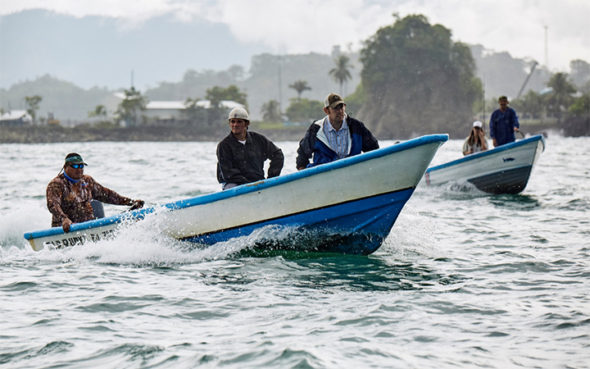It's not infrequent that we meet someone who seems born and bred to spend their lives doing exactly what they were meant to do. We don't think that's coincidental in the context of working in food, where so many of us have passions that drive us to make our career choices. And there doesn't seem to be anything coincidental about Sean's efforts to revolutionize the seafood industry, although there is a lot of good fortune in his connections, and wisdom in his ability to take what he learned from past experiences, and pour it into one major career goal.
When did you know that you wanted to work in food?
I come from a long lineage of restaurant owners, and was born and bred in the food-industry-briar-patch. I started working at my family's tavern when my age had single digits and opened my own place in Westhampton Beach, New York, when I was 24.
How did you get your current good food job?
I blended a lifetime of work experience in two industries, restaurants and wild fisheries; then drew inspiration, support and guidance from a local farmer in Amagansett named Scott Chaskey, and a chef in Westchester named Dan Barber, and generously sprinkled some pixie dust on all of that - and then: Voilà! (wah-lah) the Dock to Dish movement was born.
How did your previous work or life experience prepare you for a good food job?
My whole life has been spent working on a dock or serving a dish. As far back as I can remember, and over many decades of working in both restaurant and fishing industries in New York, I was able to explore the deepest corners of each respective industry ecosystem. Over the years I was able to study their histories and examine their raw fundamentals; experience the trends and changes; learn to speak the languages of each industry fluently - and most importantly - build strong trust bonds and relationships with a full spectrum of hard-working influential people across all platforms. All of those components were distilled down into something totally new by 2012, when using only the best of the best of the best of what I had gathered and learned over a lifetime, we managed to crystallize it all into one game-changing concept of membership-based sustainable seafood sourcing called Dock to Dish that we are now rapidly deploying around the globe.
What was the greatest obstacle you had to overcome in pursuing your Good Food Job dream?
Over ninety percent of seafood in the U.S. is imported and there is an unbelievable amount of misinformation, mislabeling and seafood fraud running rampant in our country right now. So the condition of the existing market, and the lack of public awareness about it, are the greatest obstacles we fight to overcome. We do a ton of work educating our members about what is really going on out there, while providing them with solutions to many of the problems they encounter while trying to source truly sustainable, traceable wild seafood these days.
Name one positive thing that a former employer taught you that you continue to appreciate?
Chef Dan Barber taught me to think big when it comes to solving systemic problems in the intersection of food and environmental work. Dan introduced me to the discipline of big thinking, which is based on a Wes Jackson quote, "If you're life's work can be accomplished in your lifetime, you're not thinking big enough." And that has helped keep me focused on the mission and motivated at times when the lifting is very heavy or alarm clocks are going off at 2:30am to start the work day. Working in wild fisheries is hard work, which is why hardly anyone wants to do it!
What can you identify as the greatest opportunities in food right now?
Right now we have the unprecedented opportunity to use food to solve the most dire threat to ever face humanity as we know it: climate change. Wild fisheries are the canaries in the coal mine of the planet's environmental health, and what we are seeing happen here - now - is keeping me up at night. Water temperatures are rising and the migration patterns of marine species are changing accordingly. Restructuring our food systems is an enormous part of solving the climate change problem, and there is an incredible amount of work to do.
If you could be compensated for your work with something other than money, what would it be?
To see the Dock to Dish model for sourcing local, wild seafood eventually replace the industrialized systems that are currently destroying the planet. I would also like unlimited double espressos from Jack's Stir Brew in Amagansett, and a dinner date with Norah Jones.









